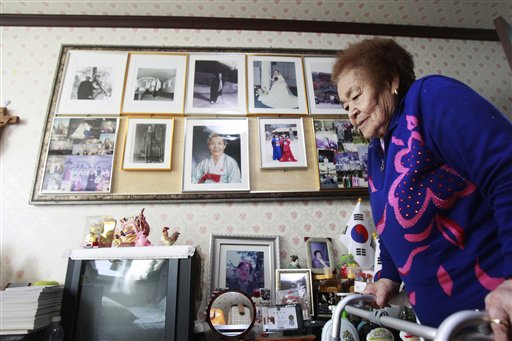
In this Feb. 3, 2014 photo, Kim Gun-ja, 89, a former comfort woman who was forced to serve for the Japanese troops as a sexual slave during World War II, passes by her portraits at the House of Sharing, a nursing home and museum for 10 former sex slaves, in Toechon, South Korea. AP
SEOUL, South Korea — Japan sent Thursday a promised one billion yen ($9.6 million) to a South Korea foundation for former sex slaves for wartime Japanese soldiers, as part of a controversial deal struck last year aimed at settling the “comfort women” issue.
Mainstream historians say up to 200,000 women, mostly from Korea but also other parts of Asia including China, were forced to work in Japanese military brothels during World War II.
The plight of the so-called comfort women is a hugely emotional issue that has marred relations between the two Asian neighbors for decades and which, for many South Koreans, symbolizes the abuses of Japan’s 1910-45 colonial rule over the Korean peninsula.
Last December, the two nations reached a “final and irreversible” agreement, under which Tokyo offered an apology and one billion yen to open a foundation for the dwindling number of comfort women who are still alive.
Tokyo formally wired the payment to South Korea’s state-run Reconciliation and Healing Foundation Thursday morning, Seoul’s foreign ministry said in a statement.
Seoul said the money would be used for financial assistance for the surviving victims — currently numbered at 40 — and families of the victims who have already died.
But the deal was condemned by some of the women and South Korean activists, who took issue with Japan’s refusal to accept formal legal responsibility.
A group of 12 comfort women filed a lawsuit against Seoul this week for signing the agreement without their consent and despite Tokyo’s refusal to take legal responsibility.
The compromise agreement also drew a mixed reaction in Japan, with some far-right activists and newspapers criticizing Japan’s Prime Minister Shinzo Abe for offering the apology.